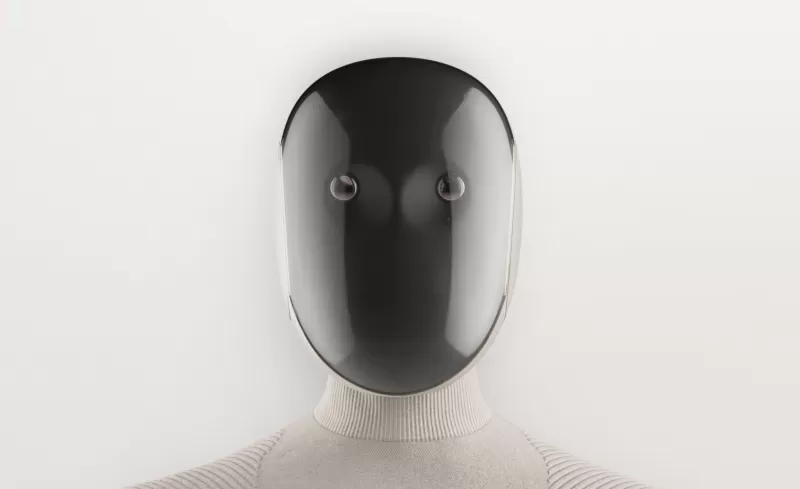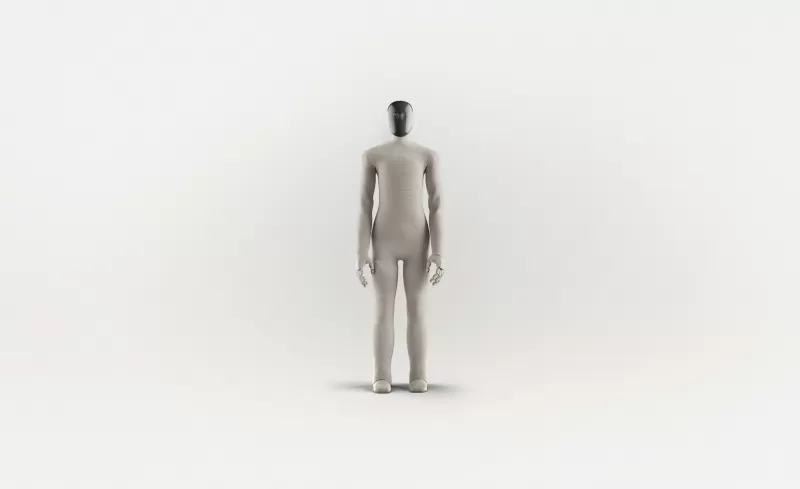1X to Test Humanoid Robots in Hundreds of Homes in 2025

Norwegian robotics startup 1X is gearing up to test its humanoid robot, Neo Gamma, in a few hundred to a few thousand homes by the end of 2025, according to CEO Bernt Børnich. "Neo Gamma is going into homes this year," Børnich shared with TechCrunch at Nvidia GTC 2025. "We're inviting early adopters to help us refine this system. We want Neo to live and learn with people, and for that, we need folks to welcome Neo into their homes and guide its behavior."
The buzz around home-use humanoid robots has been growing lately. Figure, a competitor based in the Bay Area, announced in February plans to start home testing its robots in 2025. Not long after, Bloomberg reported that Figure was eyeing a $1.5 billion fundraise at a staggering $40 billion valuation. Meanwhile, OpenAI, an investor in 1X, is reportedly considering developing its own humanoid robots.
Introducing heavy robots into homes is a big deal for this emerging industry, much like autonomous vehicle startups rolling out their robotaxis. Things can go wrong fast. Børnich admits that Neo Gamma is still far from being ready for widespread commercial use and full autonomy.
While Neo Gamma uses AI to walk and balance, it's not yet fully autonomous. To make home testing feasible, 1X is using teleoperators—humans who can remotely control Neo Gamma's movements using real-time camera and sensor data.
These home tests will help 1X gather crucial data on how Neo Gamma functions in a home environment. Early adopters will contribute to a valuable dataset that 1X can use to enhance its AI models and improve Neo Gamma's performance.
Despite being backed by OpenAI, Børnich says 1X develops its core AI technology internally. The company also sometimes collaborates on AI model training with partners like OpenAI and Nvidia.
Of course, collecting data from home microphones and cameras for AI training raises privacy concerns. A 1X spokesperson told TechCrunch that customers can control when a 1X employee can access Neo Gamma's surroundings for auditing or teleoperation.
Unveiled in February, Neo Gamma is 1X's first bipedal robot prototype to be tested outside the lab. It boasts an upgraded onboard AI model and a knitted nylon body suit designed to minimize injury risks during human-robot interactions.
Here with the sweater robot pic.twitter.com/yxwtb2vBiA
— Max Zeff (@ZeffMax) March 19, 2025
During a demo at GTC, 1X showed off Neo Gamma performing basic tasks in a living room, with some help from a human operator. The robot vacuumed, watered plants, and navigated the room without bumping into anything. However, it wasn't perfect; at one point, it started shaking and collapsed into Børnich's arms. An employee cited poor Wi-Fi and a low battery as the culprits.
Like Figure, 1X hasn't fully detailed its early adopter program or go-to-market strategy for Neo Gamma, though there's a waitlist on their website. It's tough to picture how Neo Gamma will function at home without teleoperation. The spokesperson promised a "more thorough explanation" down the road.
While a few hundred or thousand people might get to try an early, human-assisted version of Neo Gamma this year, it looks like we're still years away from being able to buy fully autonomous humanoid robots off the shelf.
Related article
 1X Develops Home Humanoid Robot in Norway
Norwegian robotics company 1X introduced its newest home robot, Neo Gamma, on Friday, marking a step forward from its predecessor, Neo Beta, which was unveiled in August. Neo Gamma, still in the prototype phase, is designed for testing in home environments. Photos released by the company show the ro
1X Develops Home Humanoid Robot in Norway
Norwegian robotics company 1X introduced its newest home robot, Neo Gamma, on Friday, marking a step forward from its predecessor, Neo Beta, which was unveiled in August. Neo Gamma, still in the prototype phase, is designed for testing in home environments. Photos released by the company show the ro
 Manus Debuts 'Wide Research' AI Tool with 100+ Agents for Web Scraping
Chinese AI innovator Manus, which previously gained attention for its pioneering multi-agent orchestration platform catering to both consumers and professional users, has unveiled a groundbreaking application of its technology that challenges convent
Manus Debuts 'Wide Research' AI Tool with 100+ Agents for Web Scraping
Chinese AI innovator Manus, which previously gained attention for its pioneering multi-agent orchestration platform catering to both consumers and professional users, has unveiled a groundbreaking application of its technology that challenges convent
 Why LLMs Ignore Instructions & How to Fix It Effectively
Understanding Why Large Language Models Skip Instructions
Large Language Models (LLMs) have transformed how we interact with AI, enabling advanced applications ranging from conversational interfaces to automated content generation and programming ass
Comments (40)
0/200
Why LLMs Ignore Instructions & How to Fix It Effectively
Understanding Why Large Language Models Skip Instructions
Large Language Models (LLMs) have transformed how we interact with AI, enabling advanced applications ranging from conversational interfaces to automated content generation and programming ass
Comments (40)
0/200
![MatthewSanchez]() MatthewSanchez
MatthewSanchez
 April 24, 2025 at 12:32:54 PM EDT
April 24, 2025 at 12:32:54 PM EDT
Can't wait to see Neo Gamma in action! The idea of having a humanoid robot at home sounds exciting, but I'm a bit worried about privacy. Still, it's a cool step forward for robotics. Let's hope they iron out any kinks before the rollout! 🤞


 0
0
![AlbertGarcía]() AlbertGarcía
AlbertGarcía
 April 23, 2025 at 12:46:29 PM EDT
April 23, 2025 at 12:46:29 PM EDT
The idea of testing humanoid robots in homes is both exciting and a bit scary! Neo Gamma seems pretty advanced, but I'm not sure I'd want one in my house yet. It's cool that 1X is pushing the boundaries, but I hope they've thought through all the privacy issues. 🤔


 0
0
![ChristopherAllen]() ChristopherAllen
ChristopherAllen
 April 22, 2025 at 6:14:35 AM EDT
April 22, 2025 at 6:14:35 AM EDT
La idea de probar robots humanoides en casas es emocionante y un poco aterradora. Neo Gamma parece bastante avanzado, pero no estoy seguro de querer uno en mi casa todavía. Es genial que 1X esté empujando los límites, pero espero que hayan considerado todos los problemas de privacidad. 🤔


 0
0
![HaroldLopez]() HaroldLopez
HaroldLopez
 April 21, 2025 at 7:10:49 PM EDT
April 21, 2025 at 7:10:49 PM EDT
네오 감마가 집에 들어오다니 정말 기대돼요! 미래의 친구 같아서 설레네요. 가구를 마음대로 움직이지 않을까 걱정되지만😅 집안일을 도와준다면 좋겠어요. 프라이버시는 신경 쓰이지만, 앞으로의 시대가 기대됩니다!


 0
0
![CharlesThomas]() CharlesThomas
CharlesThomas
 April 21, 2025 at 3:14:18 AM EDT
April 21, 2025 at 3:14:18 AM EDT
ネオガンマが家庭に来るのを楽しみにしてます!未来の友達みたいでワクワクします。家具を勝手に動かされないか心配だけど😅家事を手伝ってくれるなら嬉しいですね。プライバシーは気になるけど、これからの時代が楽しみです!


 0
0
![BillyThomas]() BillyThomas
BillyThomas
 April 20, 2025 at 1:00:54 PM EDT
April 20, 2025 at 1:00:54 PM EDT
¡Estoy emocionado por ver a Neo Gamma en acción! La idea de tener un robot humanoide en casa suena genial, pero me preocupa un poco la privacidad. Sin embargo, es un gran paso adelante para la robótica. ¡Espero que solucionen cualquier problema antes del lanzamiento! 🤞


 0
0

Norwegian robotics startup 1X is gearing up to test its humanoid robot, Neo Gamma, in a few hundred to a few thousand homes by the end of 2025, according to CEO Bernt Børnich. "Neo Gamma is going into homes this year," Børnich shared with TechCrunch at Nvidia GTC 2025. "We're inviting early adopters to help us refine this system. We want Neo to live and learn with people, and for that, we need folks to welcome Neo into their homes and guide its behavior."
The buzz around home-use humanoid robots has been growing lately. Figure, a competitor based in the Bay Area, announced in February plans to start home testing its robots in 2025. Not long after, Bloomberg reported that Figure was eyeing a $1.5 billion fundraise at a staggering $40 billion valuation. Meanwhile, OpenAI, an investor in 1X, is reportedly considering developing its own humanoid robots.
Introducing heavy robots into homes is a big deal for this emerging industry, much like autonomous vehicle startups rolling out their robotaxis. Things can go wrong fast. Børnich admits that Neo Gamma is still far from being ready for widespread commercial use and full autonomy.
While Neo Gamma uses AI to walk and balance, it's not yet fully autonomous. To make home testing feasible, 1X is using teleoperators—humans who can remotely control Neo Gamma's movements using real-time camera and sensor data.
These home tests will help 1X gather crucial data on how Neo Gamma functions in a home environment. Early adopters will contribute to a valuable dataset that 1X can use to enhance its AI models and improve Neo Gamma's performance.
Despite being backed by OpenAI, Børnich says 1X develops its core AI technology internally. The company also sometimes collaborates on AI model training with partners like OpenAI and Nvidia.
Of course, collecting data from home microphones and cameras for AI training raises privacy concerns. A 1X spokesperson told TechCrunch that customers can control when a 1X employee can access Neo Gamma's surroundings for auditing or teleoperation.
Unveiled in February, Neo Gamma is 1X's first bipedal robot prototype to be tested outside the lab. It boasts an upgraded onboard AI model and a knitted nylon body suit designed to minimize injury risks during human-robot interactions.
Here with the sweater robot pic.twitter.com/yxwtb2vBiA
— Max Zeff (@ZeffMax) March 19, 2025
During a demo at GTC, 1X showed off Neo Gamma performing basic tasks in a living room, with some help from a human operator. The robot vacuumed, watered plants, and navigated the room without bumping into anything. However, it wasn't perfect; at one point, it started shaking and collapsed into Børnich's arms. An employee cited poor Wi-Fi and a low battery as the culprits.
Like Figure, 1X hasn't fully detailed its early adopter program or go-to-market strategy for Neo Gamma, though there's a waitlist on their website. It's tough to picture how Neo Gamma will function at home without teleoperation. The spokesperson promised a "more thorough explanation" down the road.
While a few hundred or thousand people might get to try an early, human-assisted version of Neo Gamma this year, it looks like we're still years away from being able to buy fully autonomous humanoid robots off the shelf.
 1X Develops Home Humanoid Robot in Norway
Norwegian robotics company 1X introduced its newest home robot, Neo Gamma, on Friday, marking a step forward from its predecessor, Neo Beta, which was unveiled in August. Neo Gamma, still in the prototype phase, is designed for testing in home environments. Photos released by the company show the ro
1X Develops Home Humanoid Robot in Norway
Norwegian robotics company 1X introduced its newest home robot, Neo Gamma, on Friday, marking a step forward from its predecessor, Neo Beta, which was unveiled in August. Neo Gamma, still in the prototype phase, is designed for testing in home environments. Photos released by the company show the ro
 Manus Debuts 'Wide Research' AI Tool with 100+ Agents for Web Scraping
Chinese AI innovator Manus, which previously gained attention for its pioneering multi-agent orchestration platform catering to both consumers and professional users, has unveiled a groundbreaking application of its technology that challenges convent
Manus Debuts 'Wide Research' AI Tool with 100+ Agents for Web Scraping
Chinese AI innovator Manus, which previously gained attention for its pioneering multi-agent orchestration platform catering to both consumers and professional users, has unveiled a groundbreaking application of its technology that challenges convent
 Why LLMs Ignore Instructions & How to Fix It Effectively
Understanding Why Large Language Models Skip Instructions
Large Language Models (LLMs) have transformed how we interact with AI, enabling advanced applications ranging from conversational interfaces to automated content generation and programming ass
Why LLMs Ignore Instructions & How to Fix It Effectively
Understanding Why Large Language Models Skip Instructions
Large Language Models (LLMs) have transformed how we interact with AI, enabling advanced applications ranging from conversational interfaces to automated content generation and programming ass
 April 24, 2025 at 12:32:54 PM EDT
April 24, 2025 at 12:32:54 PM EDT
Can't wait to see Neo Gamma in action! The idea of having a humanoid robot at home sounds exciting, but I'm a bit worried about privacy. Still, it's a cool step forward for robotics. Let's hope they iron out any kinks before the rollout! 🤞


 0
0
 April 23, 2025 at 12:46:29 PM EDT
April 23, 2025 at 12:46:29 PM EDT
The idea of testing humanoid robots in homes is both exciting and a bit scary! Neo Gamma seems pretty advanced, but I'm not sure I'd want one in my house yet. It's cool that 1X is pushing the boundaries, but I hope they've thought through all the privacy issues. 🤔


 0
0
 April 22, 2025 at 6:14:35 AM EDT
April 22, 2025 at 6:14:35 AM EDT
La idea de probar robots humanoides en casas es emocionante y un poco aterradora. Neo Gamma parece bastante avanzado, pero no estoy seguro de querer uno en mi casa todavía. Es genial que 1X esté empujando los límites, pero espero que hayan considerado todos los problemas de privacidad. 🤔


 0
0
 April 21, 2025 at 7:10:49 PM EDT
April 21, 2025 at 7:10:49 PM EDT
네오 감마가 집에 들어오다니 정말 기대돼요! 미래의 친구 같아서 설레네요. 가구를 마음대로 움직이지 않을까 걱정되지만😅 집안일을 도와준다면 좋겠어요. 프라이버시는 신경 쓰이지만, 앞으로의 시대가 기대됩니다!


 0
0
 April 21, 2025 at 3:14:18 AM EDT
April 21, 2025 at 3:14:18 AM EDT
ネオガンマが家庭に来るのを楽しみにしてます!未来の友達みたいでワクワクします。家具を勝手に動かされないか心配だけど😅家事を手伝ってくれるなら嬉しいですね。プライバシーは気になるけど、これからの時代が楽しみです!


 0
0
 April 20, 2025 at 1:00:54 PM EDT
April 20, 2025 at 1:00:54 PM EDT
¡Estoy emocionado por ver a Neo Gamma en acción! La idea de tener un robot humanoide en casa suena genial, pero me preocupa un poco la privacidad. Sin embargo, es un gran paso adelante para la robótica. ¡Espero que solucionen cualquier problema antes del lanzamiento! 🤞


 0
0





























